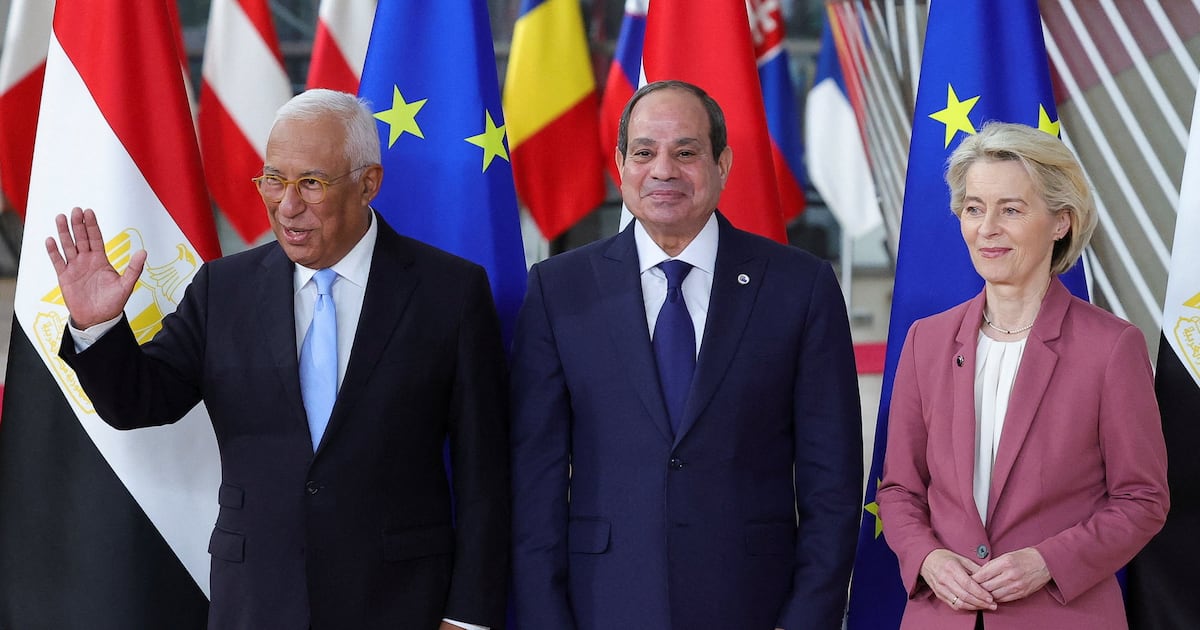The European Union and Egypt on Wednesday said they would strengthen their economic ties at their first joint summit in Brussels, with a number of announcements aimed at diversifying partnerships amid global economic turbulence.
Talks on migration, scientific research and energy investments were on the agenda as the EU and Egypt seek to build on a strategic partnership signed in June 2024. The two sides also want to co-operate in supporting the entrance of humanitarian aid into Gaza.
The EU and Egypt signed “a new tranche of macro-financial assistance for Egypt, reaching a total of €5 billion [$5.81 billion] in support,” European Commission President Ursula von der Leyen said ahead of the summit, standing alongside Egypt’s President Abdel Fattah El Sisi.
The funds are part of a previously announced package of €7.4 billion in loans, investment and support for specific programmes, such as migration, that was announced in June 2024, when the EU and Egypt signed a joint declaration.
A total of €4 billion was given the go-ahead by the European Parliament in June, with the remaining €1 billion disbursed in December 2024.
Egypt will also join the EU’s Horizons research incubation programme, a €175 billion fund for scientific research and innovation in fields from quantum technology to the space industry. To date, 21 countries, including the UK, Tunisia and Israel, are associated with Horizon Europe.
Another €75 billion in grants to address socio-economic challenges in Egypt were announced by the EU, as well as three additional smaller financial operations to support sustainable development, green economy and migration.
‘Let’s join forces’
“Today, we often rely on products made very far away – from batteries to software. What if we joined forces to produce them in our common region? This is a vision we share,” Ms von der Leyen said.
The EU is Egypt’s main trading partner. Egypt exports almost three times more goods to Europe than to the US, China, Russia, Brazil and India combined, Ms von der Leyen said.
Mr El Sisi said: “I would like to call you to take a different approach to Egypt, not as an important market but as a reliable partner. We will make it possible to develop productivity so as to improve competitiveness across Europe and Egypt.”
The two leaders were addressing an investment conference organised on the fringes of the summit that was attended by more than 100 representatives from the Egyptian private sector and about 40 European companies from 19 countries, principally in the energy sector.
Addressing European worries over Egypt’s soaring inflation and economic troubles, Mr El Sisi said the Egyptian government had introduced a package of reforms to boost its credit rating and that foreign direct investments had increased by 14 per cent.
Of further interest to European companies is Egypt’s location at the crossroads of Africa and the Middle East, as well as its “broad system of incentives for investors, including tax exemptions”, Mr El Sisi said.
“We can facilitate the production of vaccines, fertilisers, renewables, above all green hydrogen, chips, as well as structures needed for transport infrastructure.”
Tackling challenges ‘one by one’
The Egyptian President’s speech came after a detailed presentation by Egypt’s Minister of Investment and Foreign Trade Hassan El Khatib, who outlined the nation’s economic priorities. “We know the challenges, but we’re taking them one by one,” he said. Inflation in Egypt is currently at 12 per cent but is expected to fall to 9 per cent by the end of next year, he added.
The EU is seeking partners amid fears that European consumers could suffer from China-US trade tension. “It is of utmost importance to diversify our partners”, Dubravka Suica, EU Commissioner for the Mediterranean, told The National. “We have allies but we have to rely on ourselves.”
The EU, which is the leading donor to the Palestinian Authority, is also keen to work with Egypt on Gaza’s reconstruction. In a meeting with the EU’s foreign affairs minister Kaja Kallas earlier in the day, Mr El Sisi “expressed Egypt’s aspiration to strengthen co-operation with the European Union to implement the agreement and US President Donald Trump’s plan”, his office said.
Senior EU officials, who are also under pressure from member countries on the southern Mediterranean to curb illegal migration, were also told that Egypt was a leading partner. Egypt has achieved in “preventing the departure of illegal immigration boats since September 2016”, Mr El Sisi told Ms Kallas, his office reported.
Egypt, with a population of 116 million, says there are nine million migrants in the country, including about 900,000 who are refugees or asylum seekers registered with the UN refugee agency.
The deal injected much-needed funds into the Egyptian economy, which has been hit hard by years of government austerity, the coronavirus pandemic, the fallout from Russia’s invasion of Ukraine and, most recently, the Israel-Hamas war in Gaza. Houthi attacks on shipping routes in the Red Sea have also slashed Suez Canal revenue by forcing maritime traffic away from the waterway and round the southern tip of Africa.
